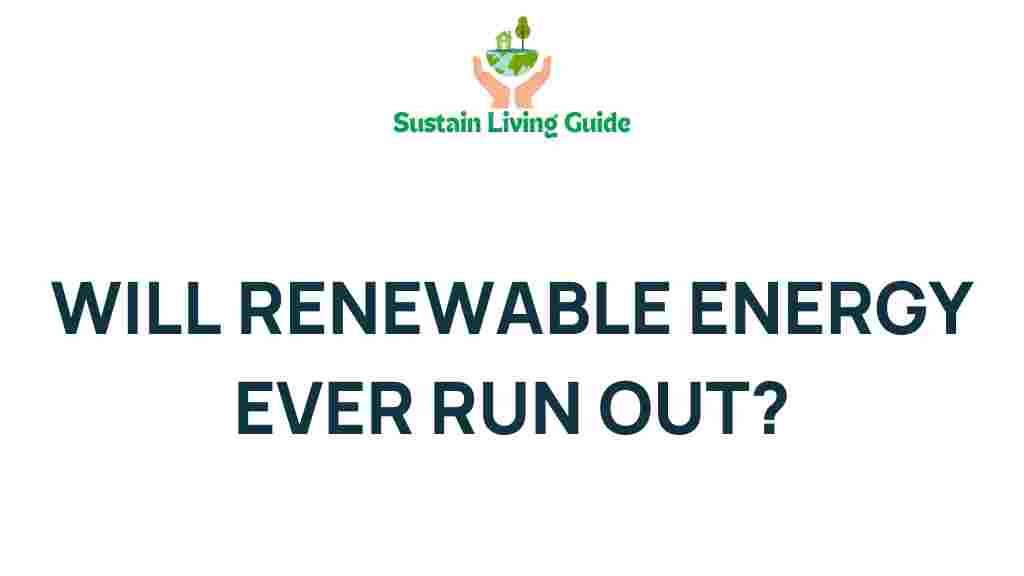The Endless Debate: Will Renewable Energy Ever Run Out?
In recent years, the conversation surrounding renewable energy has taken center stage in discussions about sustainability, climate change, and our planet’s future. As the world grapples with energy needs, environmental concerns, and economic factors, the question arises: will renewable energy ever run out? This article delves deep into the concept of renewable energy, its types, benefits, and the factors influencing its longevity. We will also explore the debate surrounding its sustainability and provide insights on how society can best harness these resources.
Understanding Renewable Energy
Renewable energy refers to energy generated from natural resources that replenish themselves over short periods. Unlike fossil fuels, which take millions of years to form and are finite, renewable energy sources include:
- Solar Energy: Harnessed from the sun’s rays, solar energy is one of the most abundant forms of renewable energy available.
- Wind Energy: Generated by wind turbines, this energy is captured from the movement of air in the Earth’s atmosphere.
- Hydropower: Produced from the flow of water, hydropower is a significant renewable energy source, especially in areas with large water bodies.
- Biomass: This type of energy is derived from organic materials such as plant and animal waste.
- Geothermal Energy: This energy comes from the heat stored beneath the Earth’s surface, providing a constant energy source.
The Benefits of Renewable Energy
Renewable energy presents a multitude of advantages:
- Environmental Benefits: It reduces greenhouse gas emissions and minimizes air pollution, contributing to a healthier planet.
- Energy Independence: Countries can reduce reliance on imported fuels, enhancing national security.
- Job Creation: The renewable energy sector is labor-intensive, creating a significant number of jobs in installation, maintenance, and technology development.
- Cost-Effectiveness: The cost of renewable energy technologies has decreased dramatically, making them competitive with fossil fuels.
Will Renewable Energy Ever Run Out?
The question of whether renewable energy will ever run out is complex and multifaceted. To address this, we need to consider the following factors:
1. Nature’s Abundance
Renewable energy sources are inherently abundant. For example:
- The sun provides enough energy in one hour to power the entire planet for a year.
- Wind energy is generated by natural atmospheric processes, meaning as long as the Earth has an atmosphere, we will have wind.
- Water cycles and geothermal heat are consistent and reliable, ensuring a continuous supply of energy.
Thus, when considering natural replenishment, renewable energy sources are unlikely to ‘run out’ in the traditional sense.
2. Technological Advancements
Technological progress plays a crucial role in the sustainability of renewable energy. Innovations in:
- Energy storage (like batteries)
- Efficiency improvements in solar panels and wind turbines
- Smart grid technology
These advancements increase the viability and longevity of renewable energy sources, making them more efficient and accessible. For an in-depth look at the latest innovations, visit this resource.
3. Resource Management and Sustainability Practices
While the sources of renewable energy are abundant, their effective management is vital. Sustainable practices must be adopted to ensure that energy resources are utilized responsibly:
- Implementing regulations to prevent over-extraction of resources (e.g., hydropower).
- Promoting biodiversity when installing solar and wind farms.
- Encouraging community involvement in energy projects.
4. Human Factors
Human behavior and decision-making significantly impact the sustainability of renewable energy. Factors such as:
- Policy decisions
- Public awareness and education
- Economic incentives
These can either promote or hinder the development of renewable energy. The debate often centers around the need for robust policies that support renewable energy investments.
Step-by-Step Process: Transitioning to Renewable Energy
Adopting renewable energy is a gradual process that can be broken down into several steps:
Step 1: Assess Energy Needs
Understand your current energy consumption and identify areas for improvement. This may involve conducting an energy audit for homes or businesses to determine how much energy can be produced from renewable sources.
Step 2: Explore Available Options
Research the types of renewable energy suitable for your location. For instance:
- Solar panels might be more feasible in sunny regions.
- Wind turbines are ideal in areas with consistent wind patterns.
- Geothermal systems are best in regions with volcanic activity.
Step 3: Evaluate Costs and Benefits
Consider the initial investment against long-term savings. Look for incentives, rebates, or tax credits that can offset installation costs.
Step 4: Choose a Reputable Provider
Select a certified installer or energy provider with a proven track record in renewable energy. Verify their credentials and read customer reviews.
Step 5: Monitor and Adapt
Once your renewable energy system is in place, continuously monitor its performance. Be open to making adjustments or upgrades as technology evolves.
Troubleshooting Common Issues
While transitioning to renewable energy is beneficial, some challenges might arise. Here are tips to troubleshoot common issues:
- Intermittent Energy Supply: If your renewable energy system frequently fails to meet your energy needs, consider enhancing your energy storage system to store excess energy for use during low production periods.
- High Initial Costs: If the upfront cost is a barrier, research financing options, grants, and loans available for renewable energy projects.
- Maintenance Challenges: Ensure regular maintenance checks are scheduled to keep systems running efficiently, and educate yourself on basic troubleshooting.
Conclusion
The debate about whether renewable energy will ever run out often overlooks the fundamental truth: renewable energy sources are abundant and sustainable if managed properly. With advancements in technology, effective resource management, and supportive policies, society can ensure that these energy sources remain viable for generations to come. By investing in renewable energy today, we are not just securing our energy needs but also safeguarding the environment for future generations.
As we continue to explore the vast potential of renewable energy, it is crucial for individuals and governments alike to prioritize sustainable practices and innovations. For more information on renewable energy policies and advancements, consider visiting this external resource.
This article is in the category Energy and created by SustainLivingGuide Team
